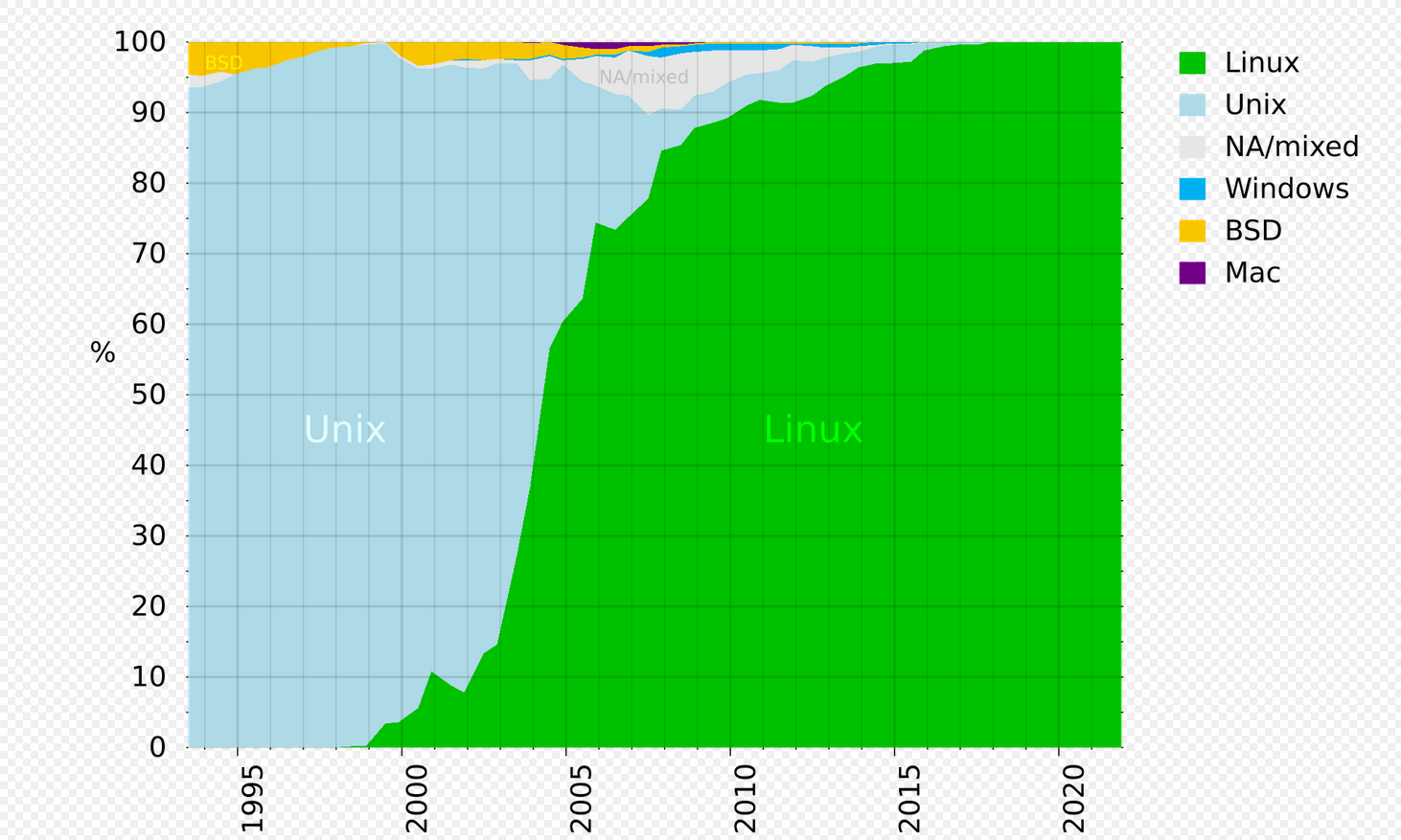this post was submitted on 15 Nov 2024
827 points (99.3% liked)
Linux
63514 readers
884 users here now
From Wikipedia, the free encyclopedia
Linux is a family of open source Unix-like operating systems based on the Linux kernel, an operating system kernel first released on September 17, 1991 by Linus Torvalds. Linux is typically packaged in a Linux distribution (or distro for short).
Distributions include the Linux kernel and supporting system software and libraries, many of which are provided by the GNU Project. Many Linux distributions use the word "Linux" in their name, but the Free Software Foundation uses the name GNU/Linux to emphasize the importance of GNU software, causing some controversy.
Rules
- Posts must be relevant to operating systems running the Linux kernel. GNU/Linux or otherwise.
- No misinformation
- No NSFW content
- No hate speech, bigotry, etc
Related Communities
Community icon by Alpár-Etele Méder, licensed under CC BY 3.0
founded 6 years ago
MODERATORS
you are viewing a single comment's thread
view the rest of the comments
view the rest of the comments

As someone who worked on designing racks in the super computer space about 10 q5vyrs ago I had no clue windows and mac even tried to entered the space
Have you been distracted and typed a password/PSK in the wrong field 8)
Lol typing on phone plus bevy. Can't defend it beyond that
There was a time when a bunch of organisations made their own supercomputers by just clustering a lot of regular computers:
https://en.wikipedia.org/wiki/System_X_(supercomputer)
For Windows I couldn't find anything.
If you google "Windows supercomputer", you just get lots of results about Microsoft supercomputers, which of course all run on Linux.
No there was HPC sku of Windows 2003 and 2008 : https://en.m.wikipedia.org/wiki/Windows_Server_2003#Windows_Compute_Cluster_Server
Microsoft earnestly tried to enter the space with a deployment system, a job scheduler and an MPI implementation. Licenses were quite cheap and they were pushing hard with free consulting and support, but it did not stick.
Yeah. It was bad. The job of a Supercomputer is to be really fast and really parallel. Windows for Supercomputing was... not.
I honestly thought it might make it, considering the engineering talent that Microsoft had.
But I think time proves that Unix and Linux just had an insurmountable head start. Windows, to the best of my knowledge, never came close to closing the gap.
At this point I think it's most telling that even Azure runs on Linux. Microsoft's twin flagship products somehow still only work well when Linux does the heavy lifting and works as the glue between
Where did you find that azure runs on linux? I have been qurious for a while, but google refuse to tell me anything but the old "a variant of hyper-v" or "linux is 60% of the azure worklad" (not what i asked about!)
I dont know of anywhere that Microsoft confirms, officially, that Azure, itself, is largely running on Linux. They share stats about what workloads others are running on it, but not, to my knowledge, about what it is composed of.
I suppose that would be an oversimplification, anyway.
But that Azure itself is running mostly on Linux is an open secret among folks who spend time chatting with engineers who have worked on the framework of the Azure cloud.
When I have chatted with them, Azure cloud engineers have displayed huge amouts of Linux experience while they sometimes needed to "phone a friend" to answer Windows server edition questions.
For a variety of reasons related to how much longer people have been scaling Linux clusters, than Windows servers, this isn't particularly shocking.
Edit: To confirm what others have mentioned, inferring from chatting with MS staff suggests, more specifically, that Azure, itself, is mostly Linux OS running on a Hyper-V virtualization later.
Thank you, i was hoping there was something official that i had missed.
Good question! I can't remember.
I think I read a Microsoft blog or something like a decade ago that said they shifted from a Hyper-V based solution to Linux to improve stability, but honestly it's been so long I wouldn't be shocked if I just saw it in a reddit comment on a related article that I didn't yet have the technical knowhow to fully comprehend and took it as gospel.
But, surely Windows is the wrong OS?
Windows is a per-user GUI... supercomputing is all about crunching numbers, isn't it?
I can understand M$ trying to get into this market and I know Windows server can be used to run stuff, but again, you don't need a GUI on each node a supercomputer they'd be better off with DOS...?
I could see the NT kernel being okay in isolation, but the rest of Windows coming along for the ride puts the kibosh on that idea.
Oh yes! To be clear - trying to put any version of Windows on a super-computer is every bit as insane as you might imagine. By what I heard in the rumor mill, it went every bit as badly as anyone might have guessed.
But I like to root for an underdog, and it was neat to hear about Microsoft engineers trying to take the Windows kernel somewhere it had no rational excuse to run (at the time - and I wonder if they had internal beta versions of stuff that Windows ships standard now, like SSH...), perhaps by sheer force of will and hard work.
Yeh it was system x I worked on out default was redhat. I forget the other options but win and mac sure as shut wasn't on the list